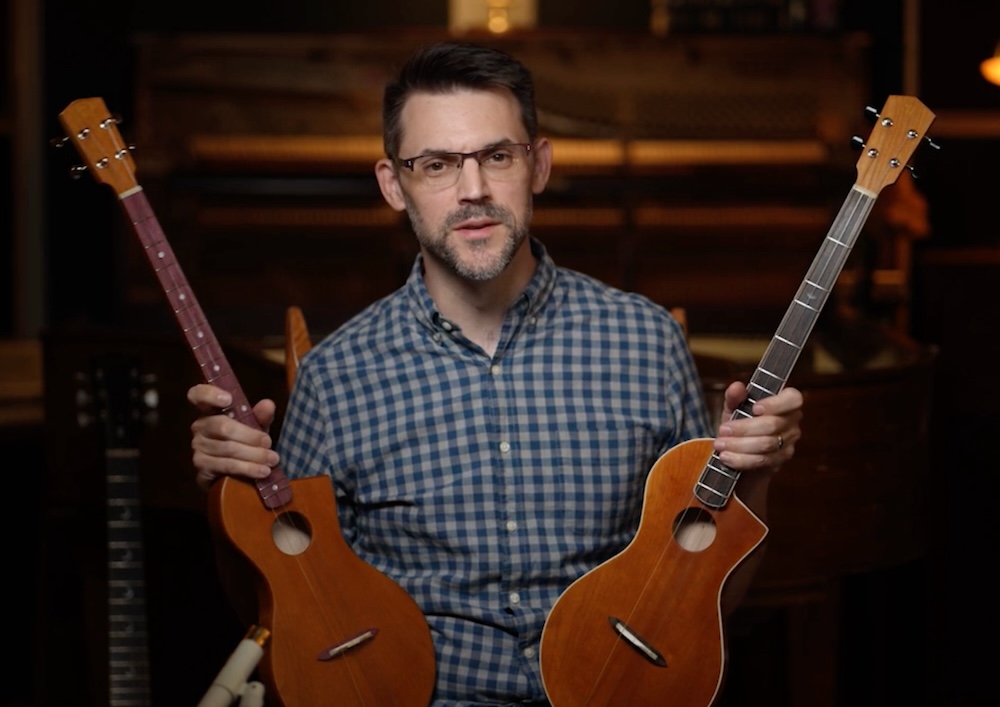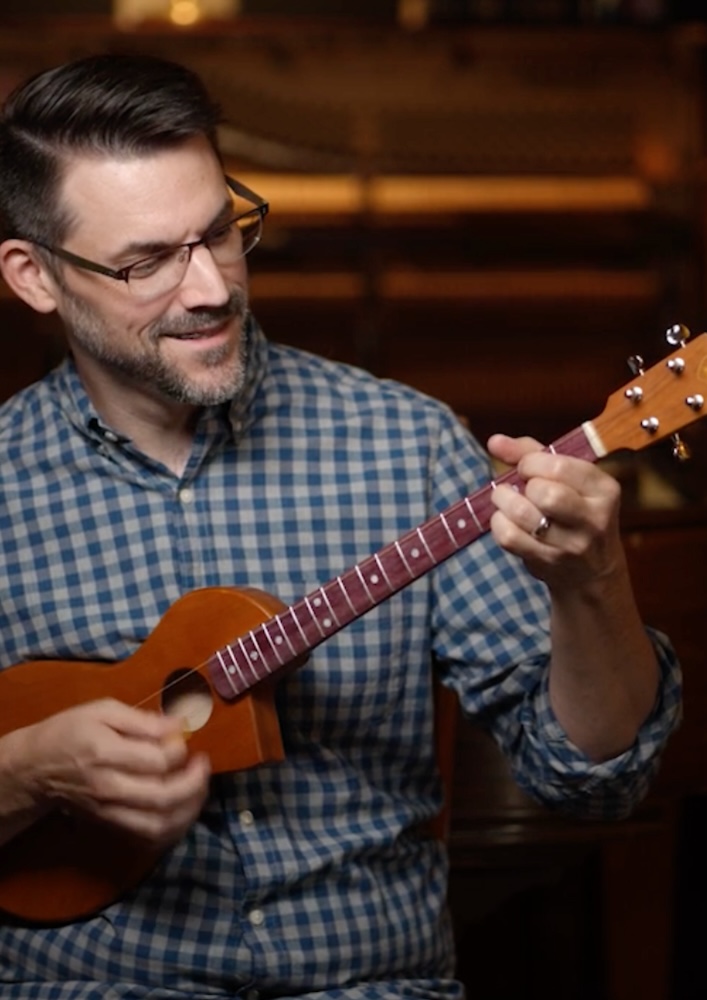Belmont Alumnus Launches Innovative New Instrument (reprint)
Alumnus Ryan Pryor Launches Innovative New Instrument
October 17, 2024 | by Haley Charlton
Ryan Pryor, a 2002 Belmont graduate with a degree in commercial music, is turning heads in the music industry with an innovative instrument design that blends traditional craftsmanship with modern technology. His creation, the Cumberland River Guitar, comes in two variants: the River Guitar and the River Dulcimer.
Belmont Roots and Diverse Career Path
 During his time at Belmont, Pryor focused on composition and recording, immersing himself in both the music and music business programs. "I was able to get an exceedingly large amount of recording engineering experience, then pair that with my music and arranging courses," Pryor explained. "I became really skilled at both aspects."
During his time at Belmont, Pryor focused on composition and recording, immersing himself in both the music and music business programs. "I was able to get an exceedingly large amount of recording engineering experience, then pair that with my music and arranging courses," Pryor explained. "I became really skilled at both aspects."
After graduating, Pryor's career took several turns, each contributing valuable skills to his future as an instrument designer and entrepreneur. His journey included:
- Spearheading innovation in multiple startups and change management initiatives
- Translating music expertise into a stint in television production
- Mastering the craft of woodworking in a cabinet shop, gaining crucial insights into production
- Leveraging his artistic background to excel in digital marketing, discovering unexpected parallels to his musical roots
This unique combination of experiences in music, television, woodworking and digital marketing provided Pryor with the diverse skill set needed to conceptualize, design and market the Cumberland River Guitar.
"It blends everything from the last 30 years of my life together: education, playing, composition, video, content, marketing and woodworking," Pryor reflected.
The Birth of the Cumberland River Guitar
The spark for Pryor's innovative instrument came in 2012 when he encountered a mountain dulcimer-inspired instrument. This discovery rekindled his passion for music and set him on a path to creating something new and different, an instrument he knew was missing from the space.
Pryor's entrepreneurial journey began in earnest in 2021 when he started prototyping his own version of the instrument. He collaborated with a luthier — a maker of stringed instruments — to refine and finalize the product, a process that culminated in late 2022.
The Cumberland River Guitar is designed to be both distinctive in sound and player-friendly, making it easier for people to experience the joy of making music.
"The dulcimer version is based on the mountain dulcimer; it's fretted different than a guitar,” Pryor explained. “The way it's strung means it sounds good without doing anything, and you can barely play wrong notes because it's all in one key."
Pryor's design philosophy for the Cumberland River Guitar draws inspiration from his college days at Belmont. In former professor Jeff Lisenby's composition class, Pryor learned a valuable lesson about creativity and constraints. When faced with the daunting task of writing a song from scratch, students often froze. However, Lisenby cleverly demonstrated that the creative process became more manageable and often more fruitful by imposing specific limitations — such as using only certain chords or rhythms.
"Creativity through constraint" influenced Pryor's approach to instrument design. By incorporating built-in limitations, the Cumberland River Guitar paradoxically opens new avenues for musical expression, making it both accessible to beginners and creatively stimulating for experienced players.
Belmont Connections and Future Plans
Pryor's Belmont experience has been instrumental in his success. The relationships formed during his time at the University have continued to play a crucial role in his venture. Several alumni have been involved in marketing and demonstrating the instrument, including:
- Christina Rado, who has been part of the project since its inception and is helping with marketing
- Zach and Maggie White and Michelle Raybourn, who have created demo videos showcasing the instrument's capabilities
His pre-sale campaign has been successful, with 19 units sold out of a target of 30 before the end of October. The instrument has also garnered international interest, with customers from five different countries placing orders.
 Looking ahead, Pryor's vision extends beyond just selling instruments. He's considering developing an educational library, potentially as a subscription service, featuring guest interviews and lessons. He's also exploring the possibility of creating a mid-tier model to make the instrument more accessible.
Looking ahead, Pryor's vision extends beyond just selling instruments. He's considering developing an educational library, potentially as a subscription service, featuring guest interviews and lessons. He's also exploring the possibility of creating a mid-tier model to make the instrument more accessible.
"I don't want to be a guy who owns an instrument company that only sells instruments everybody already can get elsewhere," Pryor explained. "I want to make instruments that sound and act differently, bringing a new creative option to seasoned players, while making music more accessible to new musicians and getting them to the joy of making music faster. I want to help grow a little bit of enjoyment in the world through music."
Pryor's journey from music student to instrument designer and entrepreneur showcases the potential of combining passion with education. His story serves as an inspiring example for current students and the broader community, demonstrating how diverse experiences and skills can converge to create innovative business ventures.
"I wouldn't have been able to do any of this if it weren't for all the skills and experiences I've developed, including my college education," Pryor reflected. "There isn't a single experience that I don't use."
In addition to Pryor’s website, follow along with product updates via Facebook and Instagram.
